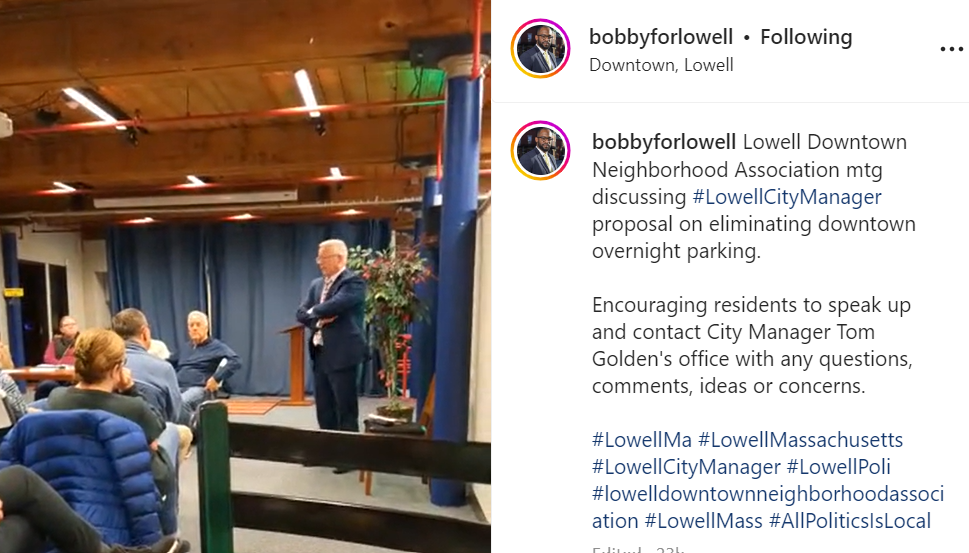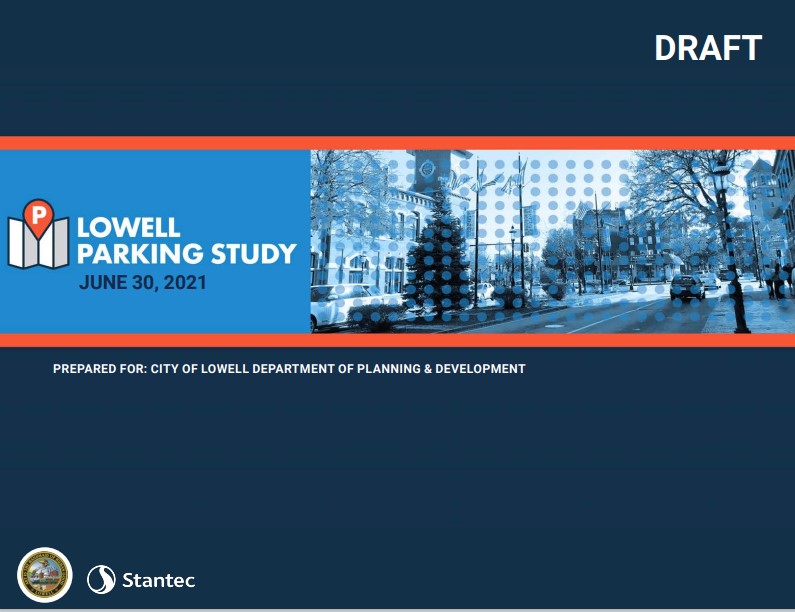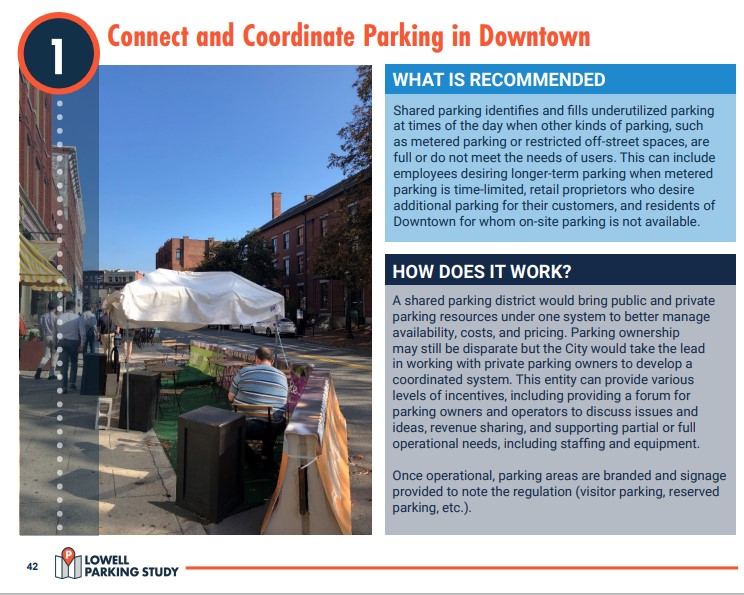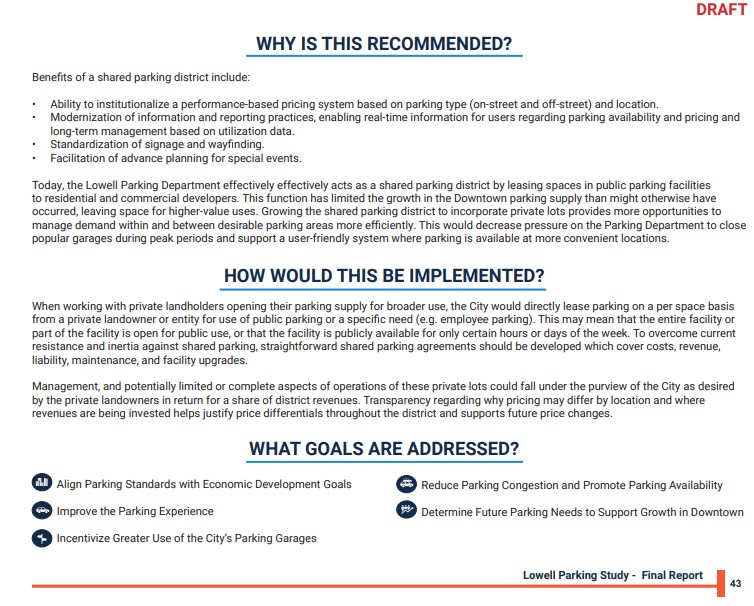
On November 28 Manager Golden met with the Lowell Downtown Neighborhood Association to discuss his proposal to eliminate overnight parking in the downtown neighborhood. The Manager’s argument was twofold: (1) eliminating overnight parking would make it easier to clean streets and remove snow; and (2) freeing-up spots would make the downtown more hospitable businesses.
The first point is speaks for itself and can probably be resolved with some tweaks to current practices. As to the second point, there is concern on the Manager’s part that people will park at night and keep their car there all day or weekend – thus hogging a spot that could otherwise be used by a customer at a business. The Manager cited conversations with potential business owners who do not want to invest downtown due to a (perceived) lack of parking. I am unclear as to whether these business owners were asking for this specific solution. Nevertheless, Manger Golden should be commended for tackling a difficult subject head-on. Parking policy debates are often messy. Moreover, telling a neighborhood group that you want to take something away from them is a suicide mission.
Bobby Tugbiyele was kind enough to attend and record the meeting for those who could not attend. He has given permission to share his post:
https://www.instagram.com/tv/Clho5ioJGR8/?s=31
If you watch the video, the proposal was not well received. Feedback on social media has also been unfavorable. There were a number of arguments in opposition. Of note:
- The policy is not well-tailored to meet its objectives;
- Residents would be robbed of one of the few city-endorsed perks of living downtown;
- Garage parking is neither easy nor enticing;
- There are public safety concerns in when using garages after dark.
I think it’s important to focus on a question asked by Mr. Tugbiyele, himself: whether this proposal was tethered to any existing parking study?
About two years ago, during the Donoghue administration, the city accepted a $225,000 Housing Choice Grant award from the Executive Office of Housing and Economic Development (EOHED) to formulate the exact type of comprehensive parking strategy that Mr. Tugbiyele was referring to.
The reason we spent all that money was to “review and analyzing existing parking conditions including parking inventory, utilization, policies, management, regulations, and pricing, as well as analyzing the parking supply and demand compared to existing land uses.” Further, “the Parking Study [would] help ensure that the parking system is consistent with the City’s economic development and transportation planning goals.”
Prior to issuing recommendations, the authors of the study conducted four neighborhood meetings, a virtual community meeting, a public outreach survey and key stakeholder meetings. In other words, much of the heavy lifting on Downtown parking issues has already been done. The draft report was completed in June of 2021. Despite the cost and effort that went into it, for some reason, the report itself is not posted on the City’s Parking Study webpage. Nevertheless, it’s very well done, is full of actual data, and is worthy of our attention. I’ll try to find a way to link to it in my “Resources” page.

The report offers seven recommendations to better manage our parking supply – much of it, obviously, in the Downtown:
- Connect and Coordinate Parking Downtown
- Create Availability to Performance-Based Pricing
- Invest in Neighborhoods with Parking Benefit Districts
- Re-Imagine Residential Parking Permits
- Unlock Underutilized Parking in Neighborhoods
- Equip Parking Operations with the Right Tools
- Monitor Performance to Keep on Top of Change


Each recommendation has information on specific action steps that can and should be taken. Nowhere in the report will you find a recommendation to eliminate overnight parking downtown. Further, if you go through the list of recommendations you will find that the city has yet to adopt and implement most, if not all of them. In fairness, new equipment is coming, there is currently a recommendation to eliminate parking minimums in the Downtown Mixed-Use District, and it sounds like we will finally be moving towards a dynamic pricing model. However, we haven’t really hit the ground with these initiatives as of yet.
I see logic in the Manager’s proposal, and I don’t disagree with what he’s trying to do here. Nor do I disagree with the residents who spoke in opposition. As stated – parking policy is difficult. If I had to make a call, I’d say that the Manager has identified a problem that can be remedied with better enforcement, rather than a blanket ban. Further, when a potential business owner trots out the tired trope that “there is no parking,” I should hope that there is the same respectful pushback that the Manager gave downtown residents.
Finally, and most importantly, it would be a waste to see a well-formulated plan cast aside in favor of the messy piecemeal approach that was demonstrated Monday night. If the goal is to entice new business, perhaps we could better market the city by citing our concrete plans and provide evidence of our commitment to following them.

We probably do need to look at how parking is managed downtown. Too many studies are done with little change involve in day-to-day operations.
Change is coming – new kiosks will go a long way. The garages, currently, lose money. This is partially offset by the street parking revenue. However, our equipment is only partially operational. It sounds like the new kiosks will be coming online in early 2023. In addition, the move to dynamic pricing will help us capture more revenue from our most valuable parking assets.